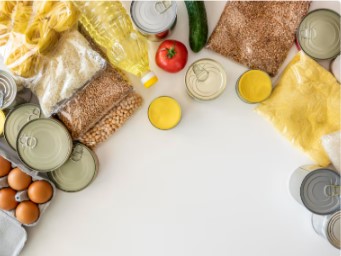Food waste is a significant problem, impacting both your wallet and the environment. From uneaten leftovers to spoiled produce, the amount of food that ends up in landfills is staggering. Not only does this contribute to greenhouse gas emissions, but it also represents a missed opportunity to nourish those in need and conserve valuable resources.
Fortunately, taking control of your food waste is easier than you think. By implementing a few simple strategies, you can minimize the amount of food you throw away and contribute to a more sustainable future.
Understanding the Problem:
Before diving into solutions, it’s crucial to understand why food is wasted in the first place. Common culprits include:
- Over-purchasing: Buying more food than you can consume before it spoils.
- Poor Storage: Improper storage leads to premature decay.
- Ignoring “Sell By” Dates: Misinterpreting sell-by dates as expiration dates.
- Picky Eating: Refusing to eat the edible parts of fruits and vegetables.
- Large Portion Sizes: Cooking or serving too much food.
Practical Tips for Maintaining Waste Food:
Here’s a breakdown of actionable steps you can take to reduce your food waste and reduce your environmental footprint:
- Plan Your Meals and Shop Smart:
- Create a Meal Plan: Before heading to the grocery store, plan your meals for the week. This will help you buy only what you need.
- Check Your Inventory: Take stock of what you already have in your fridge, freezer, and pantry to avoid buying duplicates.
- Make a Shopping List (and Stick to It): Resist impulse buys and focus on purchasing items you need for your planned meals.
- Buy “Ugly” Produce: Don’t shy away from slightly bruised or misshapen fruits and vegetables. They taste the same and are often sold at a discount.
- Optimize Food Storage:
- Proper Placement: Different foods require different storage conditions. Store fruits and vegetables in the appropriate drawers of your refrigerator.
- Airtight Containers: Use airtight containers to prevent food from drying out and extending its shelf life.
- Freeze Surplus Food: Freeze leftovers, fruits, vegetables, and even bread to prevent spoilage.
- First In, First Out (FIFO): Place older items in front of newer items to ensure you use them before they expire.
- Rethink Leftovers and Food Scraps:
- Embrace Leftovers: Plan to repurpose leftovers into new meals. Roasted chicken can become chicken salad or chicken tacos.
- Creative Cooking: Get creative with food scraps. Vegetable peels can be used to make broth, and stale bread can be transformed into croutons or breadcrumbs.
- Composting: Compost food scraps like fruit peels, vegetable trimmings, and coffee grounds. Composting reduces landfill waste and creates nutrient-rich soil for your garden.
- Understand “Sell By” and “Best By” Dates:
- Learn the Difference: “Sell by” and “best by” dates are primarily indicators of quality, not safety. Food may still be safe to eat after these dates, although its texture or flavor might be slightly compromised.
- Trust Your Senses: Use your senses (sight, smell, and taste) to determine if food is still safe to eat.
- Mindful Portioning and Cooking:
- Cook Smaller Portions: Start with smaller portions and add more if needed.
- Adjust Recipes: Adjust recipes to match the number of people you are serving.
- Encourage Leftover Consumption: Make leftovers easily accessible and encourage family members to eat them.
- Consider Food Donations:
- Donate Excess Food: If you have excess non-perishable food items, consider donating them to a local food bank or charity.
- Share with Neighbors: Offer surplus food from your surplus food shop to neighbors or friends.
The Benefits of Reducing Food Waste:
By actively working to reduce food waste, you not only contribute to a healthier planet but also reap several personal benefits:
- Save Money: Less food waste translates to lower grocery bills.
- Reduce Your Environmental Impact: Composting and reducing landfill waste helps to mitigate climate change.
- Promote Food Security: Minimizing waste helps ensure that more food is available for those who need it.
Conclusion:
Reducing food waste is a collective responsibility. By adopting these practical tips, you can make a significant difference in reducing your environmental impact and creating a more sustainable future. Start small, be consistent, and encourage others to join you on this journey toward a zero-waste kitchen.

































